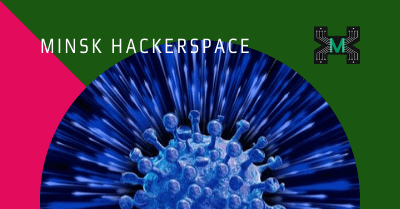
How volunteers in Belarus use 3D printing to combat medical equipment shortage during Covid-19 pandemic
Hospitals throughout Belarus are facing a shortage of personal protective equipment during the coronavirus pandemic, but communities are trying to help fill the gap. Minsk Hackerspace is a non-profit, all-volunteer DIY community in Minsk. On April 1, a group of engineers, makers, and healthcare professionals teamed up to leverage DIY manufacturing technology to support PPE production in the country.
Michail Chuprynski, one of the founders of #помощьмедикам (#helpfordoctors) tells us how the initiative started.
For me, it all began when I received a newsletter from a similar hackerspace community in New York with the information about how they use 3D printers to make face shields. It made me wonder whether hospitals in Belarus also need those. I asked the doctors I know, and they said yes, there is a need.
So, the first prototype of a face shield design was ready in seven hours. Then my team and I had to make improvements and corrections.
Does it mean that you consulted the design with medical professionals?
Yes, there are doctors in our team. Every day we receive millions of brilliant ideas, but we have to ask the doctors in our team whether these are doable and suitable. That’s how we know that we focus on what’s really important.
We also have a form for medical workers to leave requests on our website. And we published all our projects and designs so that others can download it for free.
How many people are involved in the #helpfordoctors initiative?
Our initiative has gathered 18 coordinators who organise the work of volunteers. About 700 tailors across the country sew protective garments for medical workers. They all work voluntarily and for free, and buy materials at their expenses. In addition, there are 150 people who use 3D printers to manufacture face shields and other parts of equipment.
There was an option to send a text-to-donate message with a dollar amount or so. As a result, the initiative has raised nearly $29,000. Is it because of the SMS service?
We indeed received thousands of text messages from ordinary people. It covers more than a half of the final amount. The fund “Dobra” donated around $4,000. The same amount we received from the company Xiaomi in Belarus.

There’s one challenge to this, however. We can’t receive foreign donations, as there are legal procedures that have to be preserved in Belarus. So we simply focus on those donations inside the country.
How do you make sure that your team and doctors are safe?
We follow special safety guidelines and protocols that we consulted with the doctors in our team. We use masks and sanitisers, which, curiously, doctors often give us as a form of gratitude.
Do you feel support from others who are not directly involved in the initiative?
There are some 30 or 40 people who specifically come to the Hackerspace to deliver PPE and face shields to hospitals. But there’s much more: we receive lunches from restaurants for free. We were offered a car to deliver help to hospitals. Drivers from the Trucking Association help distribute the shields more effectively.
As a result of the campaign, Minsk Hackerspace managed to produce and deliver:
48,096 shields
8652 garments
1419 snorkelling masks with adapters
In addition, volunteers have delivered protective equipment and face shields to hospitals in 156 cities and towns in Belarus.






















